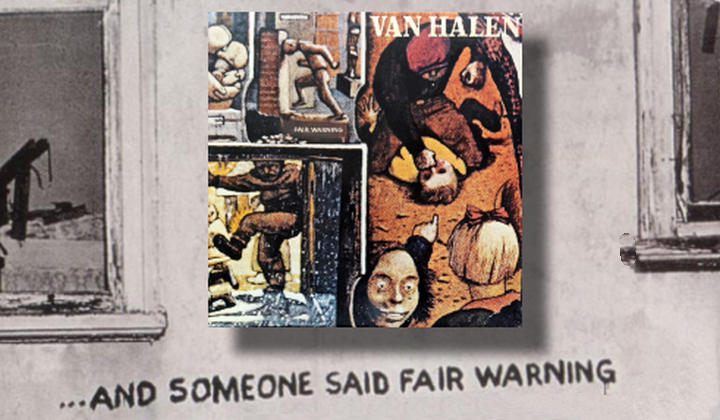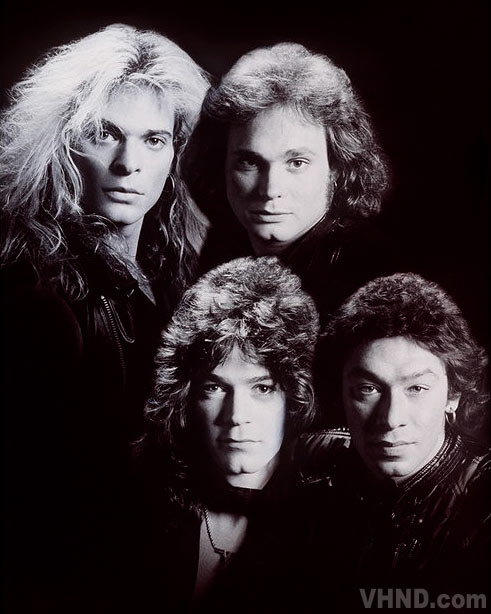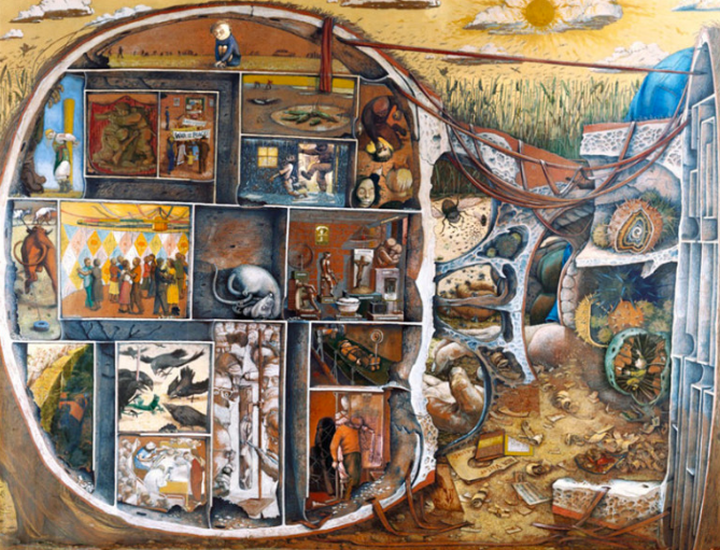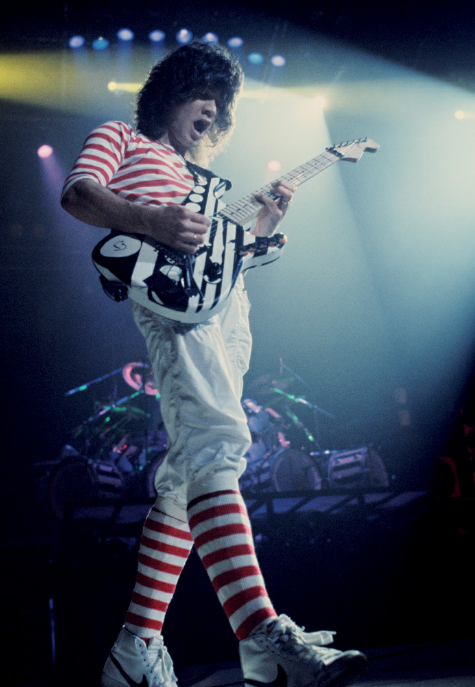
Van Halen’s 1981 album Fair Warning remains the darkest and downright meanest sounding of any record in the band’s catalog. No toes in the sand with a drink in hand. Dance the night away? Not on this dead-end street. With the absence of a good-time party rock single, Fair Warning was the slowest-selling album of the original David Lee Roth era. Despite that, the album went on to be ranked at or near the top of every “best of” Van Halen album list. What is it about this particular Van Halen album that has resonated so strongly with fans, critics, and musicians over the last four decades?
Before we try and answer that question, let’s take a look back at the creation of Van Halen’s fourth studio album Fair Warning.
Emotions Raw From The Start
Fair Warning was recorded amidst a turbulent time in Eddie Van Halen’s life. He’d become increasingly frustrated with the creative limitations put on him by producer Ted Templeman and frontman David Lee Roth. Eddie garnering media attention (albeit unwanted) for winning guitar awards and marrying actress Valerie Bertinelli didn’t ease any tensions with the spotlight-hungry Roth either. As a result, what should have been a happy time was just the opposite. Eddie told Billy Corgan in a 1996 Guitar World interview that it was “a dark period” in his life.
Angry and feeling stifled, Eddie even considered quitting the band bearing his own last name. Gene Simmons later told Rolling Stone that Eddie came to him around the time Kiss was to record their 1982 album Creatures of the Night, telling him: “I want to join Kiss. I don’t want to fight anymore with Roth. I’m sick and tired of it.”
The anger and frustration relentlessly stirring around in Eddie’s head would eventually pour out into the music. Most of it was written in the early morning hours when Eddie and engineer Donn Landee went back into the Sunset Sound studios in Los Angeles after the rest of the band was gone. As for Roth, his mind seemed to be in a similar place as Eddie’s; and at just the right time. Before work began on the album in the winter of early 1981, Roth went on a jungle adventure to Haiti, where he witnessed areas of poverty and corruption that would leave a lasting impression. It turned out he had been creatively stimulated in ways he hadn’t before, and penning lyrics about nefarious characters was just what Eddie’s music called for.

The Ominous Album Art
Fair Warning’s album art should have delivered an even clearer warning of the album’s tone than the title itself. Various images include one man smashing his head against a brick wall, and another pummeling his opponent with his fists in a street fight. The idea for the cover was Alex Van Halen’s. He saw the painting jump off the page of a book called “The Brain” from the Time-Life series published in 1964. The original artwork is from a grotesque painting by Canadian artist William Kurelek (1927-1977). At the age of 26, while being treated for schizophrenia, he created the painting he called “The Maze,” a harrowing portrayal of the mind of a tortured youth in Canada during the Great Depression. Alex knew immediately that he had found just the right image to represent the music he and his bandmates were creating.

A Musical Turning Point
Veteran guitar journalist Chris Gill (co-author of Eruption – Conversations with Eddie Van Halen) said Fair Warning marked a turning point in Van Halen’s recording history and credits the additional time Eddie and engineer Donn Landee put into the music.
“The first three Van Halen albums for the most part were reflections of the band’s live performances,” said Gill. “They were recorded in a somewhat rushed fashion, which gives them a stunning raw energy, and overdubs were generally minimal. Much of the material on these albums also dated back to the band’s club days. These albums are great documents of the band’s beginnings and roots, whereas Fair Warning was the first Van Halen album that almost entirely set its sights on the band’s future. Even older material like “Mean Street/Voodoo Queen” got a complete overhaul, like turning a 57 Chevy into a high-tech street rod, rather than the ‘new coat of paint’ treatment most of their early songs got previously.
“Ed and Donn Landee fastidiously crafted Fair Warning over a much longer period than Van Halen had worked on their previous three albums, and it shows,” continued Gill. “As a result, Fair Warning sounds much better than Van Halen’s first three albums – Ed’s guitar sounds particularly huge and clear, but Alex’s drums and Mike [Anthony]’s bass are also given more room to breathe and, as a result, have more presence and power in the mix.”
King Edward’s Crowning Achievement
Is Fair Warning Eddie’s greatest moment as a guitarist? Many guitarists say it is without hesitation or second thought. Gill credits guitarists’ overwhelming love for the album to Eddie’s tone, raw emotion, and sonic adventurousness.
“I think one of the main reasons why guitarists love this album so much is because Ed’s guitar tone sounds especially fierce, and his playing is, like the song says, unchained,” said Gill. “Whereas most of Ed’s playing previously reflected a strong blues-rock foundation with a few nods to neo-classical influences, on Fair Warning, Ed’s playing is more adventurous, sophisticated, and varied. The variety of guitar tones and techniques is staggering, including the funky percussive slaps on the intro of ‘Mean Street’, the sleazy electric slide on ‘Dirty Movies,’ and the crisp reggae-meets-fusion rhythms of ‘Push Comes To Shove’ (and those Landau-like fills!). Then there are the obvious nods to Allan Holdsworth’s growing influence that gave his solos a distinct jazz-rock fusion flavor. Ed’s solo on ‘Push Comes To Shove’ would have fit perfectly on an Al Di Meola album from that period, and his solo on ‘So This Is Love?’ could have come right out of the peak of the big band swing era. But simultaneously, his riffs were heavier than ever – ‘Mean Street’, ‘Sinner’s Swing!’ ‘Unchained’ and ‘One Foot Out the Door’ (even with the latter played on a cheap synth) make Fair Warning the most ‘metal’ album in the original Roth six-pack.

“Ed’s mastery of different styles and his innovative new techniques caused many guitarists who weren’t Van Halen or even rock music fans to admit that he was a truly talented and visionary player,” continued Gill. “With Fair Warning, Ed progressed from being one of the world’s greatest rock guitarists to one of, if not the, greatest guitarists, period.”
Author and veteran rock journalist Martin Popoff (Unchained: A Van Halen User Manual & Van Halen: A Visual Biography) attributes the album’s praise from guitarists to Eddie’s input both on the guitar and behind the boards.
“I’d say [Fair Warning] is a particular favorite for guitarists because over the years, we’ve learned that Eddie took pride in the building of the album and that it is the one he had the most attachment to as a guitarist and essentially co-producer,” said Popoff. “It’s also got no covers, which is something Eddie liked and the label and David Lee Roth did not—what happened on Diver Down was more to both parties’ liking. Guitarists love the clean and sober production, allowing a brown sound but a clean, pristine version. Guitarists also put both “Mean Street” and “Unchained” as a couple of their favorite Van Halen songs and Eddie tracks.”
With Fair Warning, Ed progressed from being one of the world’s greatest rock guitarists to one of, if not the, greatest guitarists, period.
– Chris Gill (co-author of Eruption – Conversations with Eddie Van Halen)
Rock journalist and author Michael Christopher (Van Halen: The Eruption and the Aftershock) agrees with Popoff regarding the album’s appeal among guitarists.
“I think [Fair Warning] has such a lasting legacy with guitarists because it’s the record that is most representative of Eddie playing at his peak, unencumbered by producers, bandmates, or anyone else in the studio who would make him second guess what he was doing,” said Christopher. “You have to remember Eddie was sneaking into the studio after hours to recut his guitar work and tweak the music in general – and it went unnoticed for the most part. While the debut might’ve been his most raw and fiery playing, and something like Balance his most mature, Fair Warning was where he took control over what he was hearing in his head and put it down on wax.”
A Bit Of Humor Amid The Darkness Goes A Long Way
Legendary Van Halen producer Ted Templeman has cited the Fair Warning track “Unchained” as a reminder of how special the songwriting chemistry of Eddie and Roth was. Roth’s lyrics “suited” Eddie’s riff perfectly, particularly during the song’s interlude.
Templeman arrived at the studio wearing a suit, since he had an important meeting scheduled after the recording sessions. While recording the track “Unchained,” Templeman and Roth were tossing ideas around for the post-solo breakdown in the control room. Roth started ribbing Templeman, noting how good he looked in his fancy suit. Templeman knew it was time to roll tape and let Roth do his thing and decided to play along.
Roth: “Hey man! That suit is you!!!! You’ll get some legs tonight for sure! Tell us how you do!!!!”
Templeman: “C’mon Dave….gimme a break.”
Roth: “One break….COMIN UP!!!!!”
Here is what Templeman had to say in his 2020 book Ted Templeman: A Platinum Producers Life in Music as told by author Greg Renoff:
Fair Warning ended up more moody and heavier than Van Halen’s earlier albums. Even though once again they hadn’t written a pop song like they’d done with “Dance the Night Away”, songs like “Unchained” remind me of how prolific and special the songwriting partnership was between Dave and Ed. Ed came up with this incredible riff and then Dave paired it with these fantastic lyrics.
The thing is, there were lots of heavy metal bands that put monster riffs together with memorable lyrics. But none of them could match Van Halen’s songcraft and humor. The breakdown of “Unchained” underscores what helped separate Van Halen from their competitors.
Unchaining The Unknown Factor
While Fair Warning has certainly impacted musicians, particularly guitarists, over the years, there is also the album’s appeal to the diehard Van Halen fans. In a 2015 Rolling Stone reader’s poll [Readers’ Poll: The 10 Best Van Halen Albums – Rolling Stone], Fair Warning ranked second behind the band’s legendary 1978 self-titled debut.
Christopher said Fair Warning’s lasting impact on fans is its ability to connect with fans on a deeper level than maybe any other Van Halen album.
“You really can’t underestimate the positive effect strain, pressure, frustration, and overall discontent can have on music,” said Christopher. “All of those elements were present during the recording of Fair Warning, to such a level that there was no hiding it. Sure, you had some of the humor and looseness that had become a staple on the previous Van Halen records, but the darkness that bled into the proceedings made for something more honest and insistent. People connect with that on a level they sometimes don’t even realize.”
Personal Guitar Picks
While the track “Unchained” would gain the most airplay on radio and still does, it’s the album’s opener, “Mean Street” that has left a lasting impression on Popoff.
“My personal favorite from the entire catalog, not only from the album, is ‘Mean Street’,” said Popoff. “Because of its heaviness, its no-nonsense construction, its lack of eccentricity, its sober production, and the strength of both the verse and chorus structure (where Al shines).
“’Unchained’ and ‘One Foot Out the Door‘ are also top ten for me,” added Popoff. “Huge drop after that. This is one of those albums for me that is high up the list because the highs are so high, but there are lots of lows, which, because the highs are so high, don’t hamper it being ranked high overall.”
Another fan of “One Foot Out the Door” is Christopher, who suggests listening to the song with a pair of good headphones. You’ll hear things you may never have realized were even there.
“Recently, a friend of mine had me look at ‘Push Comes to Shove’ in a totally new way,” said Christopher. “He insisted I wear headphones while I listened and told me to focus solely on Eddie’s playing; how unique the timing of what he’s doing with the volume knob and the way the guitar is not only panning from left to right, but there’s something distinctive happening at the same time in both channels. Once you experience it, you can’t unhear it. And of course, there’s that solo, which is somehow languid and propulsive at the same time. It’s amazing after all these years, listening to these songs hundreds if not thousands of times, you can still discover new bits and pieces. That’s the hallmark of a masterwork album.”
Gill’s personal pick from Fair Warning is one of the album’s deep tracks.
“‘Dirty Movies’ still gives me goosebumps like it did when I first placed Fair Warning on my turntable back in 1981,” said Gill. “To me, this is where Van Halen shifted from a Sunset Strip club band to a supergroup that dominated the Eighties and beyond. The songwriting has a sophistication that set the foundation for Ed’s work during the Sammy Hagar era, with a dramatic energy that truly is cinematic. The bump and grind of the rhythm section is sexy and menacing, and Ed’s slide playing is majestic. The vocal harmonies that kick in during the chorus are (chef’s kiss) perfection. Everything sounds mammoth. But what really makes this song my favorite is the fact that it provided a tailor-made soundtrack to one of the most memorable experiences in my life—one that shall forever remain a secret.”
So, why is Fair Warning now considered the masterpiece that it is? Is it the guitars? Is it the production? Is it the overall “attitude” of the music? A good excuse to give the album yet another listen.
Listen To Van Halen’s Fair Warning

They’re the Best of Both Worlds!
Buy the new FrankenDuo Swim Shorts at Van Halen Store!
"lasting" - Google News
April 29, 2023 at 06:58PM
https://ift.tt/LfFWiMN
The Lasting Legacy Of Van Halen's 'Fair Warning' - Van Halen News Desk
"lasting" - Google News
https://ift.tt/dGv8Vgt
Shoes Man Tutorial
Pos News Update
Meme Update
Korean Entertainment News
Japan News Update
Bagikan Berita Ini














0 Response to "The Lasting Legacy Of Van Halen's 'Fair Warning' - Van Halen News Desk"
Post a Comment